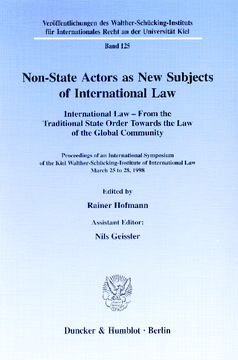Non-State Actors as New Subjects of International Law

BOOK
Cite BOOK
Style
Format
Non-State Actors as New Subjects of International Law
International Law - From the Traditional State Order Towards the Law of the Global Community. Proceedings of an International Symposium of the Kiel Walther-Schücking-Institute of International Law, March 25 to 28, 1998
Editors: Hofmann, Rainer
Veröffentlichungen des Walther-Schücking-Instituts für Internationales Recht an der Universität Kiel, Vol. 125
(1999)
Additional Information
Book Details
Pricing
Abstract
Traditionally, the only recognized subjects of public international law have been states and intergovernmental organizations. In light of the gradually changing role of the state as a consequence of the increasing process of globalization, there appears to be a growing tendency to involve non-state actors, such as non-governmental and para-governmental organizations, multinational enterprises, individuals and groups of individuals (e.g. minorities), as participants in the international law-making process. Is public international law, thus, showing a tendency to extend the number of its recognized subjects? Have new subjects of international law emerged, in addition to states and intergovernmental organizations? These questions were addressed during the 1998 International Law Symposium which brought together 26 leading scholars from the United States and Europe. In spite of the many questions that remain open, it is quite evident that the continuing process of globalization has already resulted in important changes to the traditional international order: Until recently, the role of states as the dominant actors within the sphere of public international law had remained unchallenged. This role is now being modified or even decreasing due to the increasing involvement of non-state actors.
Table of Contents
| Section Title | Page | Action | Price |
|---|---|---|---|
| Contents | 9 | ||
| Jost Delbrück: Opening Address | 13 | ||
| Rainer Hofmann: Opening Address | 15 | ||
| Ralf Stegner: Opening Address | 17 | ||
| Ruth Wedgwood: Legal Personality and the Role of Non-Governmental Organizations and Non- State Political Entities in the United Nations System | 21 | ||
| Daniel Thürer: The Emergence of Non-Governmental Organizations and Transnational Enterprises in International Law and the Changing Role of the State | 37 | ||
| Discussion | 59 | ||
| Thomas M. Franck: Individuals and Groups of Individuals as Subjects of International Law | 97 | ||
| Stephan Hobe: Individuals and Groups as Global Actors: The Denationalization of International Transactions | 115 | ||
| Discussion | 136 | ||
| List of Participants | 174 |
